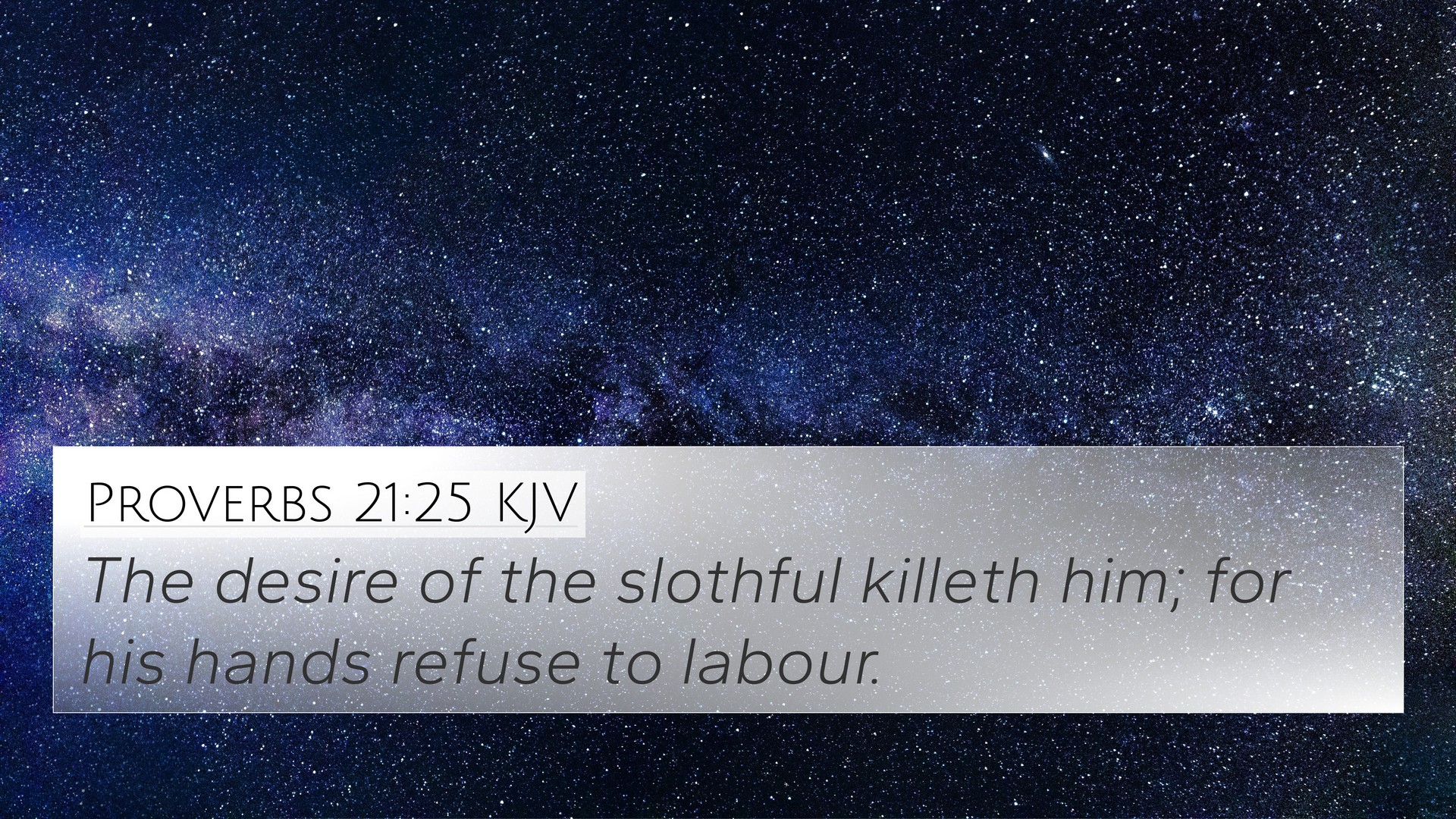Understanding Proverbs 21:25
Proverbs 21:25 states, "The desire of the slothful killeth him; for his hands refuse to labour." This verse illustrates the consequences of laziness and highlights the importance of diligence and hard work in achieving one’s desires.
Summary of Interpretations
The verse teaches that a lazy person's unfulfilled desires ultimately lead to their ruin. Their reluctance to work not only hampers their ability to achieve their goals but also brings about a negative cycle that can lead to despair and failure. In this context, labor is not simply an obligation but a vital component of a fruitful and fulfilling life.
Insights from Public Domain Commentaries
Combining insights from Matthew Henry, Albert Barnes, and Adam Clarke, we can derive a deeper understanding of this verse:
- Matthew Henry: Emphasizes that laziness leads to unfulfilled desires, highlighting the natural consequences of idleness. He warns that mere wishing will not provide sustenance; effort is necessary.
- Albert Barnes: Points out that the desires of a lazy man, which are never fulfilled, eventually lead to his demise. The verse serves as a caution against idleness and an encouragement toward industriousness.
- Adam Clarke: Focuses on the futility of inactivity, suggesting that a lack of effort not only prevents success but can also lead to moral and spiritual degradation.
Key Themes and Connections to Other Verses
This verse connects with several major themes in scripture regarding diligence, laziness, and their consequences. Notably:
- Proverbs 10:4: "He becomes poor that deals with a slack hand: but the hand of the diligent makes rich."
- Proverbs 12:24: "The hand of the diligent shall bear rule: but the slothful shall be under tribute."
- Proverbs 13:4: "The soul of the sluggard desireth, and hath nothing: but the soul of the diligent shall be made fat."
- Ecclesiastes 10:18: "By much slothfulness the building decayeth; and through idleness of the hands the house droppeth through."
- 2 Thessalonians 3:10: "For even when we were with you, we commanded you this, that if any would not work, neither should he eat."
- 1 Timothy 5:8: "But if any provide not for his own, and specially for those of his own house, he hath denied the faith, and is worse than an infidel."
- Galatians 6:7: "Be not deceived; God is not mocked: for whatsoever a man soweth, that shall he also reap."
Cross-Referencing Biblical Texts
Cross-referencing biblical texts can provide illuminating context and understanding. Here are various ways to engage in scriptural cross-referencing:
- Utilize a Bible concordance to locate parallel themes of diligence and laziness.
- Employ tools for Bible cross-referencing to explore the connections between Old and New Testament teachings.
- Study the comparative themes related to work ethic across prophetic texts and apostolic teachings.
- Analyze the links between different Proverbs that address lifestyle choices and their consequences.
- Engage with the epistles of Paul for connections regarding labor and faithfulness versus idleness.
Conclusion: The Importance of Diligence
Proverbs 21:25 serves as a poignant reminder of the pitfalls of laziness. By cross-referencing related verses, one can gain a comprehensive understanding of how scripture repeatedly underscores the value of diligence and the dangers of sloth. By diligent effort, believers can realize their aspirations and live a life that aligns with God’s expectations.
For individuals seeking insight into how to use Bible cross-references effectively, it can enhance both personal study and communal discussions. Understanding the interconnectedness of these biblical texts can deepen one’s faith and challenge the faithful to pursue diligence:
- How to find cross-references in the Bible: Start by identifying key themes and using a Bible cross-reference guide.
- Comparative Bible verse analysis: Look for verses that discuss similar themes, such as effort versus idleness.
- Cross-referencing Bible study methods: Group related verses thematically for better understanding.
- Find cross-references for Proverbs 21:25: Linking this verse with others can provide a more profound message of diligence and responsibility.














